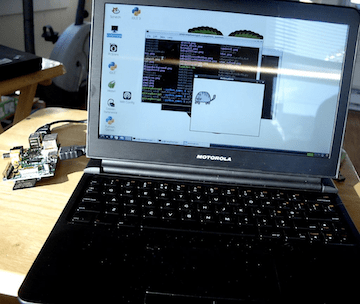Most of the million+ $35/$25 Raspberry Pi microcomputers shipped to buyers to-date have been helping U.S.- and U.K.-based makers realise their electronics’ dreams. But the original mission of the project — to inspire a new generation of programmers — remains undimmed. Which makes this Indiegogo campaign, to kit out a rural African primary school with a Pi-powered computer lab, worth a nod.
Earlier this year, the Raspberry Pi Foundation flagged up a self-funded project by a Belgian volunteer group which took a bunch of Pis out to Cameroon to set up a computer lab in another rural African school. The Pi’s low cost price-tag, low energy consumption and support for open source software gives it plenty of potential to gain ground as a first computing platform in developing nations — provided the initial funding can be found to get the hardware out to where it’s needed. So enter crowdfunding platform Indiegogo, in the latest example, to help people push Pi further.
As with the Cameroon project, the Swaziland-based project creators behind the Indiegogo campaign want to use Pi to equip a school — namely Sidvokodvo Nazarane Primary School — with a computer lab for teaching purposes. They’re seeking to raise $2,550 to fund 10 Raspberry Pis used in conjunction with Motorola Atrix laptop docks (a neat combination if you want to use a Pi as a laptop) so they can function as standalone machines without the need to buy monitors and keyboards, plus connectors and spare parts to keep the lab running.
The project is almost at its target, with just over $200 left to raise. If it exceeds the target the money will go towards buying more Pi to increase the number of machines in the lab. One of the people behind the campaign, Piers Duffell, an American volunteer working in Swaziland, notes the Pis will be used for typing tutorials, word processing programs, access to offline versions of Wikipedia, the Khan Academy for mathematics, and may also be used to let kids dabble with programming. Which is exactly what the Pi Foundation was aiming for.
